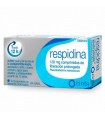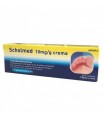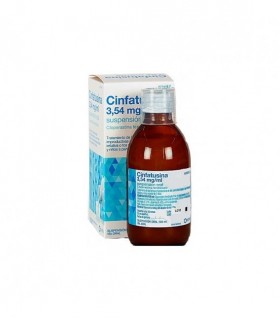Dextrometorphane, the active substance in this medicine, is an antitussive that inhibits cough reflex.
It is indicated for symptomatic cough treatment that is not accompanied by expectoration (irritative cough, nerve cough) in adults and children from 6 years of age.
You should see a doctor if it gets worse or if it does not improve after 7 days of treatment.
ACTION AND MECHANISM
- Antitussive. Dextromethophan is a derivative of 3-methoxy-levorfanol, an opiate alkaloid analogous to codeine, which acts at the level of the center of the cough, depressing it. While their exact mechanism of action is unknown, opiates could act by inhibiting the production of tachykinins, the main neurotransmitters of C-fibers, which constitute such a control.
It has an antitussive effect similar to codeine, but lacks narcotic or depressant effects of the respiratory center.
SPECIAL WARNINGS
- Watch for possible symptoms of dextrometorphane abuse, such as mood swings, changing the person's habits or appearance, or abusing large amounts of coughing products.
- Risk of serious interactions when associated with antidepressants such as IMAO or SSRD, as well as drugs with IMAO activity such as linezolid.
Elderly
While no specific dosage recommendations have been made, it is advised to use it with caution. It may be necessary to decrease the dose per administration or increase the interval between doses.
PATIENT ADVICE
- Drink plenty of water during treatment.
- Do not take dextrometorphane if you have been taking antidepressants in the previous 14 days. Talk to your doctor and/or pharmacist.
- Warn your doctor and/or pharmacist if you develop symptoms such as a persistent cough for more than 7 days despite treatment, or if accompanied by severe headache, fever or rash.
Contraindications
- Hypersensitivity to dextrometorphane, [OPIOID ALLERGY] or any other component of the medicine.
- Severe respiratory pathologies such as [ASMA], [PRODUCTIVE COUGH], [CRONICAL OBSTRUCTIVE PULMONARY DISEASE], [NEUMONIA], [RESPIRATORY FAILURE] or [RESPIRATORY DEPRESION].
- Children < 2 years (see Children).
- Treatment with MAOI, SSRI, bupropion, linezolid, procarbazine or selegiline in the previous 2 weeks (see Interactions; enzyme inhibitors).
- Lactation (see Lactation).
DRIVING EFFECTS
Dextrometorphane does not appear to have significant central depressant effects, unlike other opiates. However, dizziness is common.
Pregnancy
Animal safety: dextrometorphane is not teratogenic in animals.
Human safety :adequate and well-controlled human studies are not available. According to data collected in retrospective studies with women who used dextrometorphane during the early stages of gestation (weeks 4-14), the use of this opioid was not related to an increased risk of congenital malformations, abortion or low birth weight. However, its use could lead to respiratory depression in the neonate. Administration is only accepted if there are no safer therapeutic alternatives, and the benefits outweigh the potential risks.
Fertility effects : noside effects have been observed in animals. No specific human studies have been conducted.
Pharmacokinetics
Orally:
- Absorption: rapid absorption, with cmax of 5.2-5.8 ng/ml and tmax of 2 h after dose of 60 mg. Its effects appear in 15-30 min and last for 6 hours. Its bioavailability is reduced due to an intense liver first step effect.
Effect of food: do not affect the pharmacokinetics of dextrometorphane.
- Distribution: your vd is 7.3 l.
- Metabolism: extensive and rapid liver by CYP2D6 and CYP3A4, resulting in several demethylated metabolites. The majority is dextropharyn, partially active, and to a lesser extent 3-methoxy and 3-hydroxy-morphine, both inactive.
Enzyme inducing/inhibitor capacity: no data available.
- Excretion: in urine (20-86% in 48 h), in the form of free or conjugated metabolites. Minimum amounts in faeces (< 1%). Its t1/2 is 1.4-3.9 h (dextrometorphane) and 3.4-5.6 h (dextrorfano).
Pharmacokinetics in special situations:
- Genetic polymorphism: dextrometorphane is CYP2D6 substrate, cytochrome P450 isoenzyme from which populations with non-functional alleles, which act as slow metabolisers (up to 6% population) have been described. These patients may see reduced dextrometorphane elimination, with cmax and AUC up to 16 and 150 times higher respectively and prolonged t1/2 up to 45 h.
- Other situations: there are no specific data in children, the elderly or patients with renal or hepatic impairment. However, an increase in their t1/2 is expected in patients with hepatic impairment.
Indications
- Symptomatic treatment of impoductive [DRY TOS], such as an irritative cough or nerve cough.
Interactions
- Expectorant and mucolytic. Inhibition of cough reflex may result in pulmonary obstruction in case of increased volume or fluidity of bronchial secretions.
- Hypnotic. Risk of potentiation of the sedative effect when associated with alcohol or drugs such as barbiturates, benzodiazepines, H1 antihistamines, other opioid or antipsychotic analgesics.
- Enzyme inhibitors. Dextrometorphane is CYP2D6 substrate, so its effects and toxicity could be increased by associating drugs such as abiraterone, antiarrrhythmics (amiodarone, flecainide), bupropion, coxibes, imatinib or terbinafin. Reduce the dose of dextrometorphane if association is necessary.
Avoid consumption of grapefruit juice or bitter oranges, which may inhibit CYP2D6 and 3A4.
The association of dextrometorphane with certain CYP2D6 inhibitors such as MAOI, drugs with MAOI activity (e.g. linezolid, procarbazine) or SSRS (e.g. paroxetine) has been linked to the onset of severe serotonergic syndrome. The association is contraindicated, having to distance at least 14 days these medicines.
Carefully associate with other serotonergic drugs such as tricyclic antidepressants.
- Memantine. Dextrometorphane could potentiate memantine toxicity. Avoid association.
Breast feeding
Animal safety: no data available.
Human safety: It is not known whether it is excreted with milk, and the consequences it could have for the infant. Given the risks of respiratory depression in the infant, its use is contraindicated.
Children
Dextrometorphane could be used in children 2 years and older, with corresponding dosage adjustments depending on age. It is recommended to select those presentations especially indicated in children between 2-12 years (see Posology).
Children may be especially sensitive to the adverse effects of opiates.
Its use in < 2 years is contraindicated. Serious adverse reactions, some fatal ones, have been reported when using anti-flu OTC in these children.
RULES FOR PROPER ADMINISTRATION
Food administration: can be taken with or without food. Avoid grapefruit juice or bitter oranges.
Dosage
- Adults: 5 ml (15 mg)/4 h or 10 ml (30 mg)/6-8 h. Maximum dose 40 ml (120 mg)/24 h.
- Children and adolescents < 18 years:
* Adolescents from 12 years old: same as adults.
* Children 6-11 years: 2.5 ml (7.5 mg)/4 h or 5 ml (15 mg)/6-8 h. Maximum dose 20 ml (60 mg)/24 h.
* Children < 6 years: not adapted to this age.
- Elderly: no dosing adjustment required.
Duration of treatment: it is recommended to use for as long as possible to control symptomatology. If symptoms continue or worsen after 7 days, or if accompanied by high fever, skin rashes or persistent headache, consult a doctor and/or pharmacist.
Forgetting doses: administer the next dose at the usual time. Do not double the next dose.
POSOLOGY IN HEPATIC IMPAIRMENT
No specific dosing recommendations have been made. Use with caution.
POSOLOGY IN RENAL INSUFFICIENCY
No specific dosing recommendations have been made. Use with caution.
Precautions
- Cough. It should not be used in case of chronic coughing or smoking cough, as it may impair expectoration and increase airway resistance.
- Atopic processes. It could worsen the symptomatology of diseases such as [DERMATITIS ATOPICA] or [MASTOCITOSIS] due to increased release of histamine.
- [DROGODEPENDENCE]. Dextrometorphane can potentially lead to dependence phenomena (cases of adolescent abuse have been reported, which sometimes resulted in fatal poisoning), albeit to a much lesser extent than other opioids such as morphine. Extreme caution is recommended and monitoring the patient, especially people with a history of drug dependence, in case symptoms of abuse occur, such as mood swings, modification of the habits or appearance of the person, abuse of large amounts of cough products or disappearance of medicines from the home medicine cabinet.
- Neurological diseases. Assess the benefit/risk ratio in patients with neurological disorders associated with a decrease in cough reflex, such as [ICTUS], [DEMENCIA] or [PARKINSON'S DISEASE].
- Slow metabolizers. Dextrometorphane is a substrate of CYP2D6. About 10% of the general population is slow metabolizer of this isoenzyme, with risk of accumulation of dextrometorphane and toxicity. Lower doses of dextrometorphane may be required.
- Limitations on clinical experience. Efficacy and safety in patients with [RENAL INSUFFICIENCY] or [HEPATICA INSUFFICIENCY] have not been evaluated. Use with caution, especially in severe patients.
EXCIPIENT PRECAUTIONS
- This medicine contains ethanol. It is recommended to review the composition for the exact amount of ethanol per dose.
* Amounts less than 100 mg/dose are considered small and are not usually harmful, especially in children.
* Amounts greater than 100 mg/dose may be harmful to people with [CRONICO ALCOHOLISM], and should also be taken into account in pregnant and nursing women, children, and in high-risk groups, such as patients with liver disease ([HEPATICA INSICIENCY], [CIRROSIS HEPATICA], [HEPATITIS]) or [EPILEPSIA].
* Amounts greater than 3 g/dose may decrease the ability to drive or operate machinery, and may interfere with the effects of other medications.
ADVERSE REACTIONS
Adverse reactions are described according to each frequency interval, considered very common (>10%), common (1-10%), uncommon (0.1-1%), rare (0.01-0.1%), very rare (<0.01%) or of unknown frequency (cannot be estimated from the available data).
- Immune system disorders: unknown frequency [HYPERSENSITIVITY REACTIONS] including [ANAFILAXIA], [ANGIOEDEMA], [URTICARIA], [PRURITO], rash and [ERYTHEMA].
- Psychiatric disorders: very rare [ALUCINATIONS], [DEPENDENCE TO OPIACEOS].
- Nervous system disorders: common [MAREO]; very rare [SOMNOLENCIA]; unknown frequency [CEFALEA], [CONFUSION].
- Gastrointestinal disorders: frequent [NAUSEAS], [VOMITOS], and intestinal discomfort; unknown frequency [STRESS].
- Skin and subcutaneous tissue disorders: unknown frequency [DRUG ERUPTION].
- General disorders and alterations at the place of administration: frequent [FATIGA].
Overdose
Symptoms: Adverse reactions are often especially important in children and adolescents or in case of abuse. Symptoms described include nausea, vomiting and gastrointestinal disorders, dizziness, fatigue, drowsiness, hallucinations, restlessness and excitability. In more severe cases symptoms such as decreased concentration and consciousness to coma, dysphoria and euphoria, psychotic disorders such as disorientation and delusions can occur up to states of confusion or paranoics, increased muscle tone, ataxia, dysarthria, nystagmus and visual disturbances, as well as respiratory depression, changes in blood pressure and tachycardia.
Finally there is a risk of serotonergic syndrome.
Measures to be taken:
- Antidote: in case of severe poisoning, naloxone (0.01 mg/kg in children) could be considered.
- General disposal measures: gastric lavage with suction, followed by the administration of active charcoal.
- Monitoring: respiratory and cardiovascular functionality.
- Treatment: keep the airways open, establishing assisted breathing if necessary. Symptomatic treatment.

































